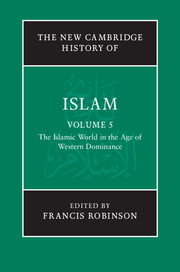Book contents
- Frontmatter
- Introduction
- PART I THE ONSET OF WESTERN DOMINATION C. 1800 TO C. 1919
- PART II INDEPENDENCE AND REVIVAL C. 1919 TO THE PRESENT
- 11 Turkey from the rise of Atatürk
- 12 West Asia from the First World War
- 13 Egypt from 1919
- 14 Sudan from 1919
- 15 North Africa from the First World War
- 16 Saudi Arabia, southern Arabia and the Gulf states from the First World War
- 17 Iran from 1919
- 18 Central Asia and the Caucasus from the First World War
- 19 Afghanistan from 1919
- 20 South Asia from 1919
- 21 South-East Asia from 1910
- 22 Africa south of the Sahara from the First World War
- 23 Islam in China from the First World War
- 24 Islam in the West
- Glossary
- Bibliography
- Index
- References
13 - Egypt from 1919
from PART II - INDEPENDENCE AND REVIVAL C. 1919 TO THE PRESENT
Published online by Cambridge University Press: 28 March 2011
- Frontmatter
- Introduction
- PART I THE ONSET OF WESTERN DOMINATION C. 1800 TO C. 1919
- PART II INDEPENDENCE AND REVIVAL C. 1919 TO THE PRESENT
- 11 Turkey from the rise of Atatürk
- 12 West Asia from the First World War
- 13 Egypt from 1919
- 14 Sudan from 1919
- 15 North Africa from the First World War
- 16 Saudi Arabia, southern Arabia and the Gulf states from the First World War
- 17 Iran from 1919
- 18 Central Asia and the Caucasus from the First World War
- 19 Afghanistan from 1919
- 20 South Asia from 1919
- 21 South-East Asia from 1910
- 22 Africa south of the Sahara from the First World War
- 23 Islam in China from the First World War
- 24 Islam in the West
- Glossary
- Bibliography
- Index
- References
Summary
The national moment
When the Young Turks allied with the Central Powers in the Great War, Britain declared Egypt a protectorate, severing its formal links to the Ottoman Empire. The British deposed the khedive, ʿAbbās Ḥilmī II (r. 1892–1914) and appointed his uncle, Ḥusayn Kāmil (r. 1914–17), sultan. Nationalists attempted to forge links with Istanbul and Berlin, and made two attempts on the sultan’s life. Yet with martial law in place, the short-lived legislative assembly proscribed and most leading politicians under house arrest, political life ground to a halt. Officially, the protectorate would last only the war’s duration, but a wave of civilian administrators arrived, along with thousands of Commonwealth troops. Egypt was the springboard for the Gallipoli campaign, then the invasion of Syria. Not under arms, but supporting British forces, were over 100,000 Egyptian conscripts. From Egypt’s farms the British requisitioned livestock, foodstuffs and equipment. Landowners were forced to plant grains instead of cotton. All of Egypt suffered from spiralling prices. Beneath the surface, nationalist politics reached a boiling point.
Two days after the armistice was signed in November 1918, the Wafd, a self-styled Egyptian delegation of nationalist leaders, presented to British authorities a formal request to attend the Paris peace conference in order to press demands for an end to the protectorate. The high commissioner, Sir Reginald Wingate, entertained Saʿd Zaghlūl (d. 1927) and several associates, but his superiors in London rejected their proposal. The Wafd commenced a petition drive validating its leadership of the national movement.
- Type
- Chapter
- Information
- The New Cambridge History of Islam , pp. 372 - 401Publisher: Cambridge University PressPrint publication year: 2010

